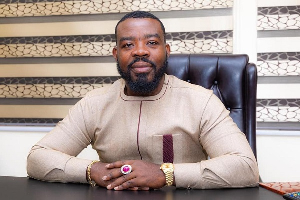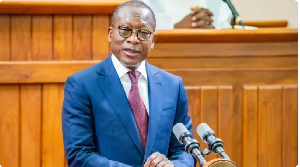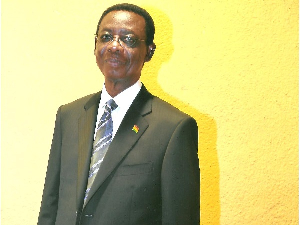General News of Wednesday, 21 May 2008
Source: GNA
IOM, Ministry of Manpower sign MOU on legal migration
Accra, May 21, GNA - The Ministry of Manpower, Youth and Employment (MMYE) and the International Organization for Migration (IOM) on Tuesday signed a Memorandum of Understanding (MOU) to facilitate a coherent migration management approach in Ghana. The MOU was signed by Mr. Davide Terzi, IOM chief of Mission to Ghana and Mr. Emmanuel Akuffo, Chief Director of Ministry Manpower, Youth and Employment.
According to Mr Terzi the IOM in partnership with the Ministry of the Interior and the MMYE would undertake a project to facilitate migration in the country through an assessment of national labour migration management, matching supply of job opportunities to demand and addressing irregular migration flows through information provision. He said the project, which was funded by the European Commission and co-funded by the Italian Government, was aimed at promoting legal migration and preventing further irregular migration which was very high in the country.
Mr Terzi said the 18-month pilot project which started last January in Ghana was intended to include Nigeria, Senegal and Libya. He said many migrants from Africa to other parts of the world did so because of economic reasons but faced hardships because they travelled illegally through risky means and did not have ready jobs to do when they arrived, thus endangering their lives.
Mr. Terzi explained that the MOU was mainly to establish a mechanism to help Ghana in migrating labour to Italy. He said the project would open a gateway for both countries to manage regular migration such that when implemented it would enable about 1,000 Ghanaians to travel to Italy to occupy job vacancies that were available.
Mr Terzi said the project would be implemented through three complementary components, including building capacities in sending countries to manage labour migration and to combat irregular migration. The others are developing the capacity of Libya as a receiving country to develop labour immigration management and sharing experiences across Africa through a workshop on sharing national practices in labour migration policy and legislation, and developing a common approach to managing labour migration in Africa.
Mr Terzi said under the three components, there would be national assessments of labour migration policies, legislation and practices, capacity-building to establish mechanisms for the identification, registration and selection of candidate migrant workers to match needs in host countries as well as information dissemination on legal labour migration opportunities and procedures and risks of irregular migration. "This sub-component will contribute to the efforts of national governments to use a rights-based approach to counter irregular migration and to provide information on regular migration options and regulations to actual and potential migrants."
He said IOM and its partners hoped that these activities would enable them to achieve specific objectives such as the reduction of irregular migration from, into and through West Africa and Libya, including the European Union, the development of mechanisms for the insertion of workers into the EU labour market by testing this mechanism between Ghana and Italy. As part of the project, IOM will provide support for the voluntary return and reintegration of up to 300 returnees from Libya and the EU to the African countries of origin targeted by this intervention. Mr Akuffo said the project was laudable and that government was prepared to protect Ghanaians living in other countries. He said the project was in line with government's new labour law on legal migration of labour to other countries to generate revenue for the country.
Mr Akuffo said the project would enable those who wanted to travel to other countries for greener pastures to be identified, registered and selected to match job opportunities that existed between Ghana and Italy, building on the annual entry quota for Ghanaian workers allocated by the Italian Government. He said the recipient countries would have to request for the number of people which matches with job opportunities that were available.
"We will recruit people to match the job opportunities that exist in the recipient countries," he said. He said they had formed working groups that comprised ministries, departments, tertiary institutions and non-governmental organizations to recruited people when the time came.
Entertainment











